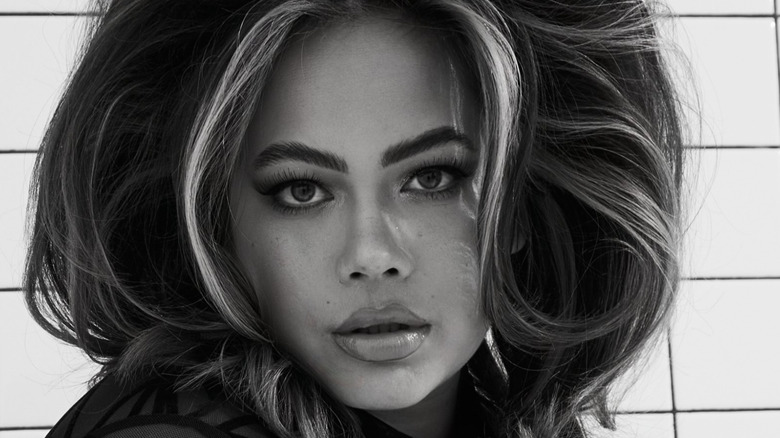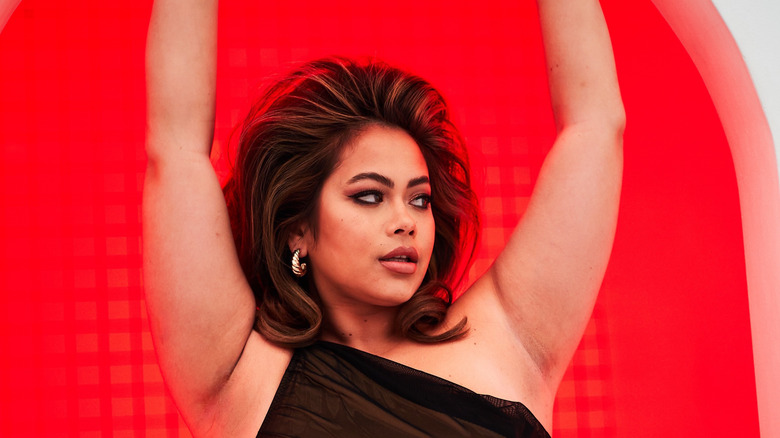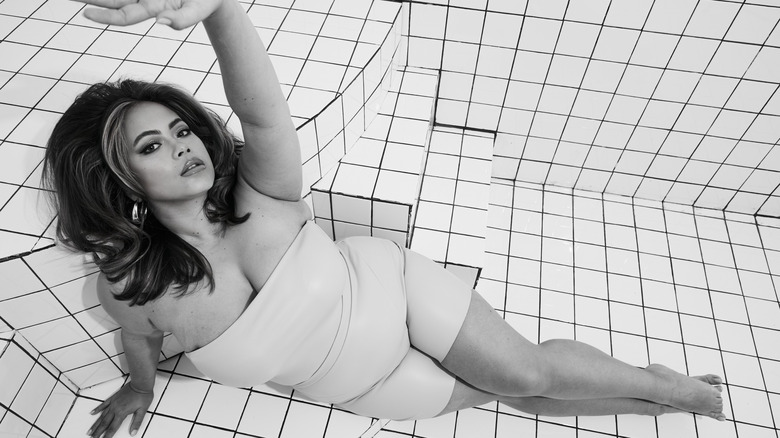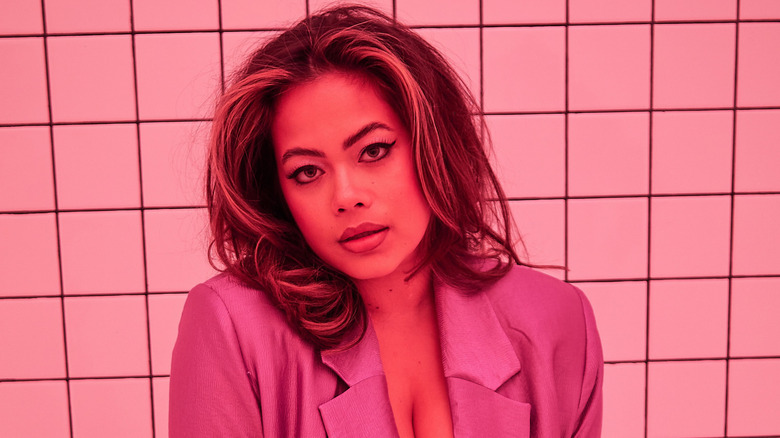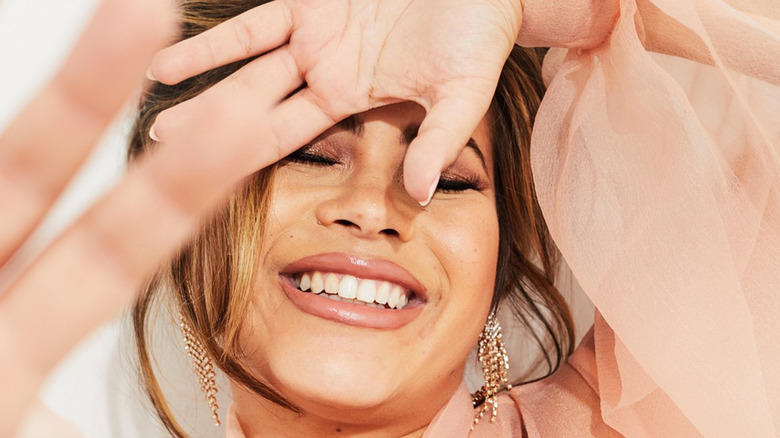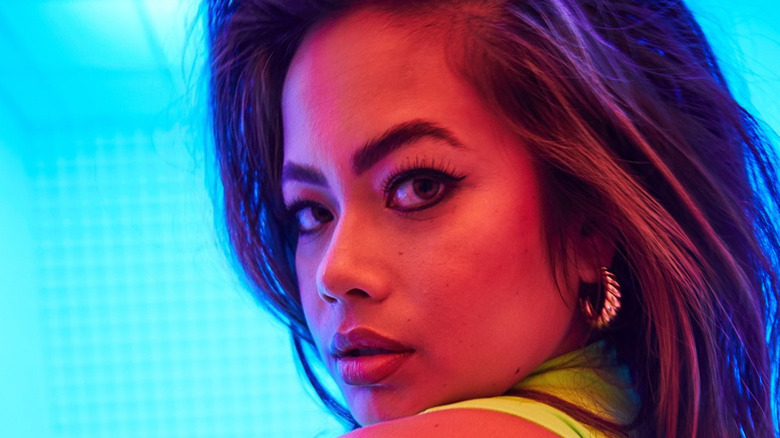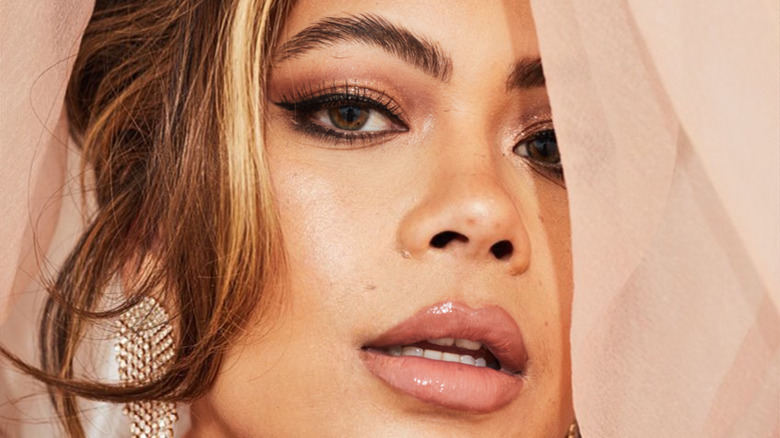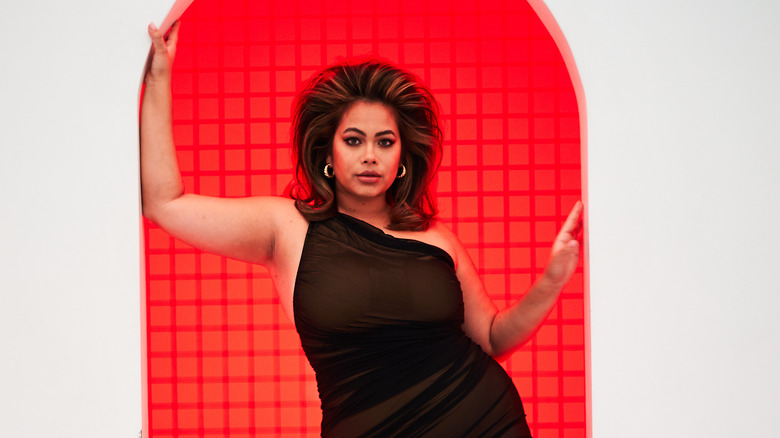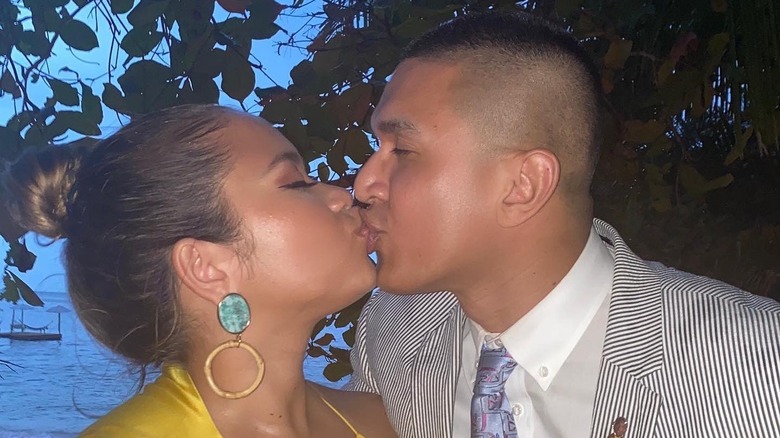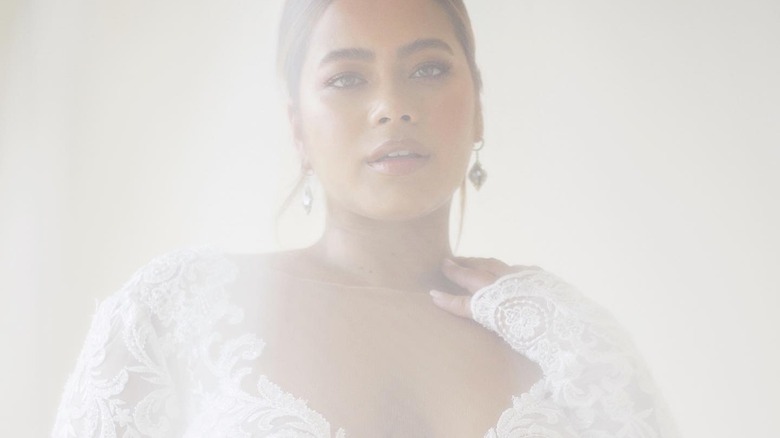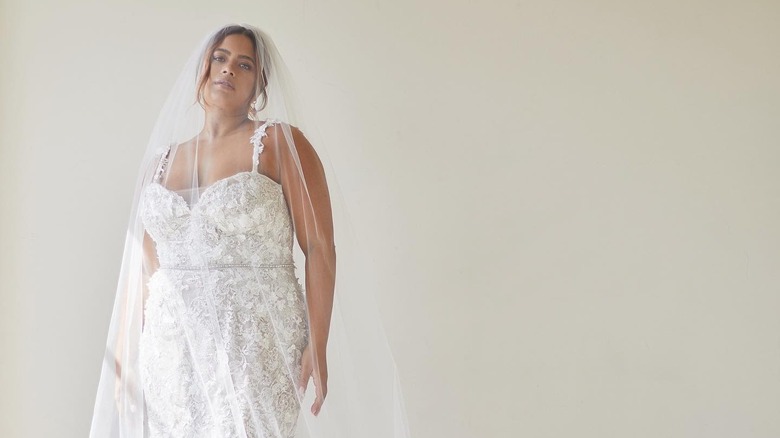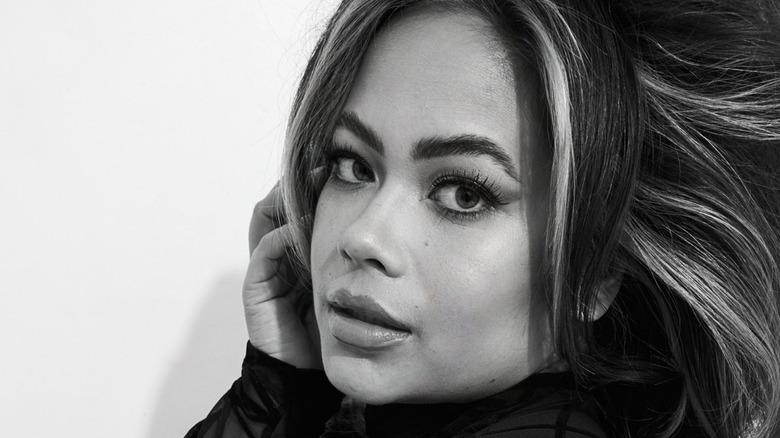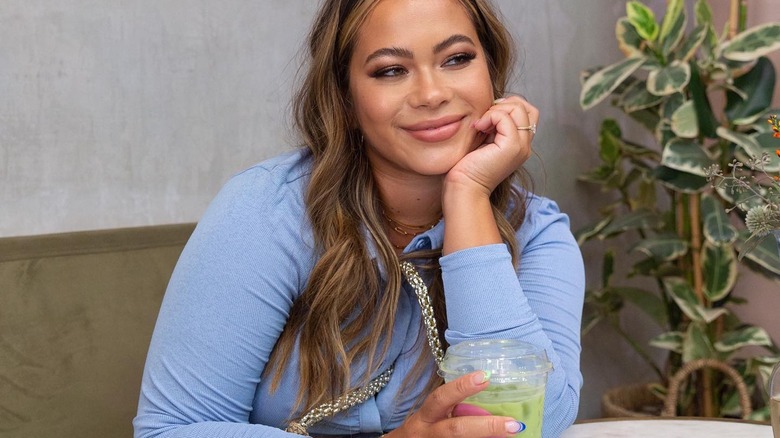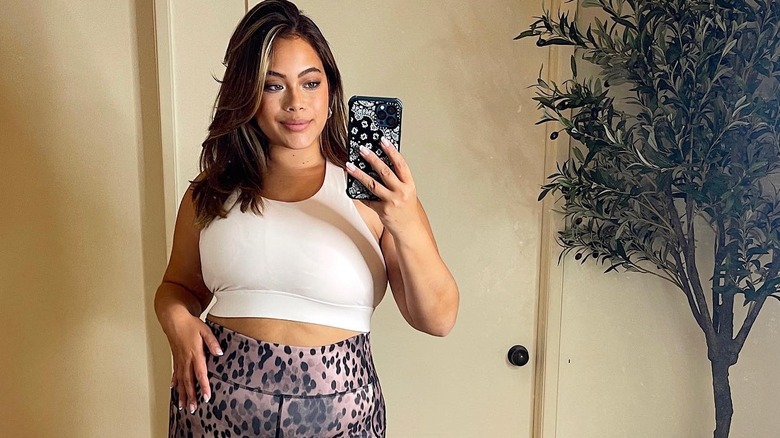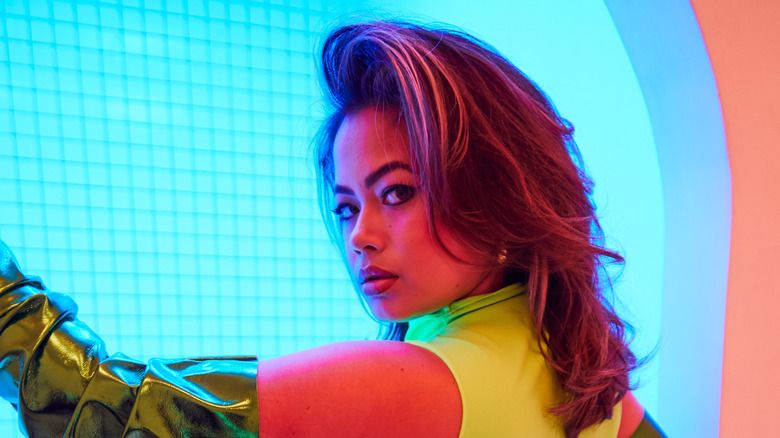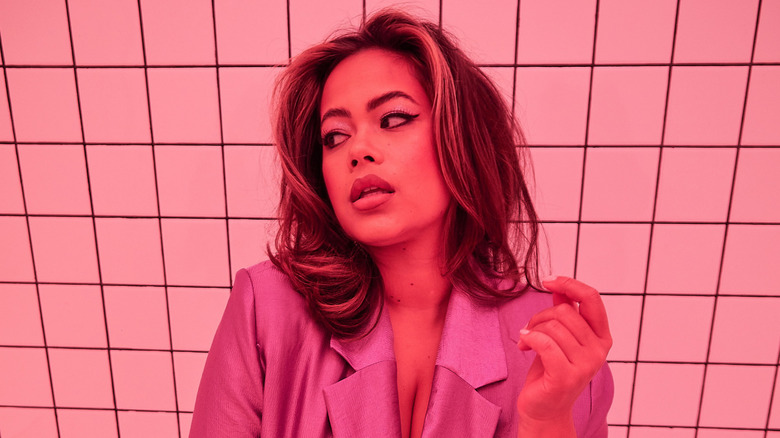Plus-Size Model And Fashion Designer Catie Li On Size-Inclusiveness, Body Image, And More - Exclusive Interview
Before Catie Li started modeling, she didn't even know that plus-size models were a real thing. Like most people, she thought all models were tall, thin, and wispy. She'd never seen anyone who looked like her — full-figured, curvy, and mixed-race — on the runway or in magazines. When Li found out that there were, in fact, women like her in the modeling industry, she decided to give it a shot.
She has succeeded in a big way. Li has booked campaigns with major brands like Nordstrom and Forever 21, and in May of 2022, she graced the cover of a major magazine for the first time, going nude for Women's Health's "Body Reflections" issue.
But it hasn't been easy. Li has plenty of firsthand experience with the fact that modeling and fashion still aren't as size-inclusive as they could be and the industries definitely aren't as size-inclusive as they say they are. She's also witnessed how modeling and fashion create a culture that prioritizes thinness and all the body image issues that happen as a result.
In an exclusive interview with Health Digest, Li talked about what it's like to be a plus-size model, how the modeling and fashion industries can be more size-inclusive, and how she's changed her relationship to her body, food, and exercise as she's embraced her plus-sized body.
A chance meeting that led to a career
How did you get started as a model?
I bought a couch off a girl from Craigslist who was a model. She was going to New York and we were chit-chatting it up, and then ... I actually left with the couch and I sat in the car, and I went back and I was like, "How do you become a plus-size model?" She literally helped me with how to do it, which is unheard of, especially in the entertainment business. Not a lot of people help each other out.
I got signed. I was a publicist during that time, so I got signed, and then I was able to quit [my job] three months after I got signed. Then I was working full-time.
I've read in previous interviews of yours that you had this moment when you spoke to her where you learned plus-size modeling is a thing.
Yeah — I had no idea. Growing up, everybody said, "Oh, you're pretty. You have a pretty face. You could be a model." Have you ever heard of Barbizon [Modeling and Acting School]?
Yes.
They actually went to my middle school, and they scouted my brother and I ... We went to tryouts, and we got to the next level. For some reason, they could only choose one of us, and they went and chose my brother! It's a running joke of the family now, because I'm actually a legit model. [Barbizon is] a class. It's not what they say it is. It's kind of scammy, actually. But I didn't think it was in my cards. If they didn't choose me, then why would they choose me later?
I never thought about it until she said "plus-size modeling." I asked, "What's that mean?" The funny part is — it's not really funny, but I was a lot smaller then. I was about a size 8 [or] 10, and I thought I was huge. I grew up in the low-rise jeans, Britney [Spears], Christina [Aguilera] moment — so I thought I was huge. Looking at photos now, I'm like, "Oh, my God, I was so skinny!" Just a different body shape. I actually was too small [for plus-size]. I had to wear fat pads and padding.
Discovering plus-size modeling
I had no idea. When she said that, I was like, "Huh?" I don't know what the instinct was, but my instinct was to go back and ask her. It was because I asked, "Do you make a lot of money doing that?" I had just gotten out of college. I was doing PR, but they don't pay PR people that much money — [I was] still asking for money from my parents. She's like, "Yeah, you make this amount of money. You can make up to six figures if you're really good." I was like, "Sign me up!" What does it hurt? I wasn't thinking it was going to be my career. I thought it was going to be some extra income that I would get here and there, if that. I had no expectations.
When I took my pictures and I was starting to get booked at Nordstrom, Forever 21, all that stuff, I was like, "Huh, okay." It [was] right place, right time. I got really lucky. There had been plus-size women doing it, but it was just starting to open to younger adult teens. That's when Forever 21 was really hot then with their plus. They're like, "We need girls that look different." I matched that because I'm very ambiguous, so I could hit a lot of things for them, and it was pure luck.
Why do you think that size inclusivity is so important in the modeling and entertainment industry?
When we're younger, we're absorbing all of that. We watch a lot of TV. We used to read a lot of magazines. We're on [social media] a lot now. The younger kids are seeing ... How we used to value magazines, they're valuing pages. When they see a smaller girl getting this much attention and that is being highlighted in fashion shows or whatever's getting picked up, it's ... Our news outlet is Instagram and Facebook. If we're not being seen in those things, more than ever this time around, it does something psychologically to our girls and our men and everybody.
It's really important. We're talking about now having all races and everything involved; we need to at least see that through and not it being something [that's only] said. It needs to be said and done — same thing with being size inclusive too. That needs to be a thing. Especially in the fashion industry, it's being said but not done, and nobody's holding them accountable for it. I don't know why — maybe because most of these magazines hold that power. I don't understand it, but nobody's talking about it. The only way we can talk about it is through creators and people on Instagram that are actually saying things about it.
Size-exclusive fashion
To that point, you're a plus-size fashion designer as well. What do you love about that, and what's difficult about it?
What's difficult is not enough opportunity, not enough people saying "I want to support and I want to invest in you and I want to help you get to where you need to get to as easily as it would be for somebody who is selling sizes small, medium, large, extra large." There's a fear of how plus-size clothing will sell, even though it's proven that it will sell. It's proven that there needs to be a demand for it. The amount of complaints that we're talking about ... [with] Torrid and stuff like that, and Lane Bryant, how they're not giving what they need to give and how there's not enough of an array of trends.
When they think plus-size, they think "old lady," and they don't think about girls growing up that need to be ... I hated shopping at the Misses department. My mom would take me to the Misses department, and she would say, "This is where you need to find your jeans and stuff." It was traumatizing. I was really hurt by it. I wanted to shop at Limited Too and Justice, and I could not fit there at all. Why aren't we touching on those things? Forever 21, H&M — they're kind of getting it, but it's still lumping in teens and young adults, and they should be separate. Nobody's doing that.
There's a lot of cons to [being a plus-size designer]. To help solve that problem ... They're not giving platforms to people, or they're not investing in people that can help change that problem. A lot of companies — years ago, because I saw it as a model — were like, "Oh, plus-size, we're going to get in and we're going to make so much money off of this!" But they didn't do any research on what we wanted [or] any research about fit. Then they pushed something out. It was ugly, and then they had to close their stores down because nobody was buying it. Now, they're too scared to touch it without actually listening to the consumer.
Struggling as a size-inclusive fashion designer
That's where I'm struggling. I could give designs for days. I can see what's in my closet. I can go on Revolve or any of these things and say, "I want this and I want it in my size. I want you to change this or that about this or that."
I've also seen how ... What they're doing with fit, for a lot of fast fashion people, is they're going to their vendors that they're getting, from downtown LA, and they're saying, "Can you add three inches? Just keep adding three inches." That's all they're doing. They're not actually putting it on people. There's a specific brand — I'm not going to call them out, but they're doing this, and they don't care about it. That's the struggle I have with that.
The pro is that I enjoy doing it. People like Amazon have given me a chance, although I wish ... How the program works, it's a three-month program, and it happens quickly. There's not enough time to focus on fit and stuff like that because your collection's only up for 36 hours. They want it fast.
I got a taste of that, but I'm still struggling today as a content creator to find companies I can team up with to do it. That's mind-blowing. It's really hard. My manager and I are having a hard time finding companies to collaborate with. They're only collaborating with people who are skinnier and maybe have millions and millions of followers.
They are having a hard time wanting to give somebody a leg up. There's a benefit for them! It would benefit them, whether somebody has a lot of following or not. If they have a style, they can put marketing dollars into that. Whatever they're putting in their regular stuff, business-wise ... they could do better.
Going nude to spread body positivity
You recently did a nude shoot for Women's Health magazine. Can you tell us a little bit about that experience?
Well, I didn't have to worry about clothes! [laughs] That was the good part. I never know what I'm going to get on set doing a shoot for a magazine. Every time somebody asks me when I'm at a photo shoot, "Can you bring some jeans you have at home?" or "Can you bring some T-shirts, some shoes?" I know that they're not prepared and the quality of it is not probably going to be where it needs to be. It's happened to me for nine years of modeling. I have special pieces at my house that I pull, but that was one thing I didn't have to worry about. I didn't have to worry about clothes. Thank God, because that would've stressed me out.
I want the same quality that everybody else is getting. I want the same quality as Hilary Duff on the cover, especially since I'm naked. I definitely feel like they brought that to the table, which was exciting. Of course, I was vulnerable. Every human being has insecurities — doesn't matter if you're completely a body-positive creator or whatever you want to call it. You still have insecurities. My whole body's out!
I didn't know they were going to put it on Yahoo. They put it on Yahoo, and it was front. It trended for a second. My whole family saw it. I was just at my brother's wedding, and my cousin's like, "I saw you on Yahoo." I'm like, "Oh, geez!" Luckily, they were beautiful photos, and I feel like they were done very, very well. I'm nervous just like anybody else, but the moment was bigger than me. It's not about how I feel and my insecurities. It's very much about how others will perceive it in a positive way. That's what I was hoping.
Body image is a universal struggle
Absolutely. Can you dig in a little more — have you struggled with body image issues throughout your life?
Of course! For me to even think at a size 8 or 10 that I'm big is ridiculous. I grew up in a predominantly Asian community. Everybody was 90 pounds and ... I was tall. My body shape was curvier than the average. My two best friends were literally stick-thin, 90 pounds, could wear low-rise jeans. That was not me.
I grew up with a lot of insecurities about my body. I remember looking in the mirror and holding my stomach, like "Why, God, why?" Sometimes I do that today — honestly, I'm not going to lie. Even being a model, they want you to be bigger, but they want you to have a flat stomach. It's impossible for some people.
Showing curves and things that they put us in, even as a model, can make me very uncomfortable because they don't care if it looks flattering on you — they just care that they're checking a box. I've been put in a lot of situations where I felt uncomfortable with my body. Sometimes, on photo shoots, I'm the only plus-size model. If you put me next to a girl who's a size double-zero, of course I'm looking really big. It's shocking to me because I am the average size, and I'm not being represented. You would think it wouldn't be that way, but I've had photo shoots recently that put me in really awkward positions.
I'm just like everybody else — I still have those issues too. That's why I also try ... There's this conversation happening about body-positive creators, how they don't want to be called "body-positive" because they want to push the body-positive message, but there's all the pressure that's put into body-positive. Let's say you want to be healthy, and when you're on the journey of being healthy, you might lose weight because you've changed your eating habits. Then it's like, "Oh, you lost weight. You're not body-positive anymore." It's finding an extreme, so it's a lot of pressure for sure.
Media and body image
How do you think that our society, in general, needs to change so that fewer people struggle with their body image and eating disorders?
The way it changes is it starts with the mass media — the people that are being cast in movies, the cool people that are influencing, that are truly influencing ... My influence is here. Kim Kardashian's and everybody else's is up here. It starts [with] any celebrities or whatever's cool and trending at the moment. They need to be cast in those roles. Netflix has done a good job for diversity, but I don't think they've done an amazing job in body diversity. [It's] adding those things in.
The more that children — and even us — see it, the more it will change our mindset about it, and we can be comfortable. It's funny, because wearing a two-piece on vacation was ... I could do it in my backyard, but I was in Hawaii, and I was being all self-conscious. I was looking around and I actually saw a lot of women my size and bigger wearing it and flaunting it. What is this whole thing about? It's social media. It's literally social media.
If you go to Europe, like in Italy, those women don't care. They're in their two-pieces, and they don't even care, and I realized it was the social media. I'm seeing my body has to be this way in order to show it, but nobody really cares. Nobody's looking at you.
Struggles of being a plus-sized bride
You're getting married soon. First, congratulations.
Thank you! Are you married?
I am, yes.
I thought I saw a ring. Wedding planning, ugh. This stuff is stressful.
That's exactly what I was going to say. You've talked a lot about what it's been like to find a dress as a plus-size person and to do all of that planning. Can you tell us a little more about that?
The dress was my biggest fear, because in my style statements, I like to try new things and do new things. What I saw was very much dresses that were from 10 years ago, maybe even longer ago. When my cousin was getting married, it was the tube top dress — no couture, nothing. None in my size.
Luckily, I found a Lovella in Glendale and they do have plus-size, and I really like them. But then I thought, "Can I have better?" I don't know. I can't tell you if I could, because I don't know. I don't know because nobody is talking about it. Nobody is talking about plus-size brides at all. It's not even a conversation.
My first article got so much positive feedback because a lot of girls were like, "I went through the same thing. I had the hardest time finding ... " Why is it that we're having [a] hard time finding plus-size dresses? We're spending thousands of dollars. Some girls spend $10,000. If I'm spending $10,000 on a dress, why do I have to imagine it on myself? I want what everybody else has. I want the opportunity to have what everybody else has. I don't understand it. I don't get it. There's no answer, and nobody's talking about it.
How the wedding industry excludes plus-sized women
Did you have to do a bunch of alterations for your dress? Did you have to hire somebody?
I actually got lucky because [with] the dress I wanted, the designer was willing to make it custom to my body. That's the only luck. The thing about me being a content creator, I've been able to have access to reaching out to designers. I had a designer reach out to me — two designers already. They're a little bit late, though. I had them reach out to me and say that they were willing to do a dress for me. But again, I don't even know if that's the best I can get. I want to look special that day.
I'm lucky that they're willing to do those things for me, but I can't imagine ... Even then, though, for my dress, I had to be like, "I want boning here." I know corset up top is what makes me look great. I have to alter a lot of things, but I heard that's not unusual. I altered a few things, the cup size and the things, but he did it for me prior. Now, I just have little alterations to do.
When you're buying off-the-rack dresses, sometimes you take it and they won't even do the alterations for plus-size women, because they say, "It's too much alteration for the dress."
I'm a size 14, and I'm two sizes up in wedding. One, I don't know why they don't change that. Come on. I did get an explanation of why they don't make a lot of samples, because it does take a lot to make one dress. I get that. But what about the women that ... I'm a 14. [People who are size] 22, and all that stuff — what are they doing? They're literally having to settle for the limited options that they have. That sucks.
Plus-size brides don't get a 'yes to the dress' moment
I didn't have a "yes to the dress" moment. Honestly, at my first try-on, I was crying. I was literally nearly in tears. My mom showed me pictures. She's like, "I took pictures. You don't look very happy." I'm like, "Yeah, I don't think I was happy because my whole a** was hanging out and I'm in front of my mother-in-law!" My mom, she's seen me butt a** naked before, but my mother-in-law ... It's weird. That sucks. I don't understand.
A bridal thing is constant, so why isn't there anybody talking about it? That's what I don't get. I don't understand why nobody's making a fuss about it. Everybody's getting married this year too, and I would think that they would try to push something about it because everybody's getting married.
That doesn't even go into the bachelorette party, rehearsal dinner, swimsuit, whatever they need. I cannot find anything, and when I find something, I've found it ... I have a suit. I've been telling everybody this because I had to think about it. [It's] a suit from six years ago. I wasn't even engaged or dating my fiancé. I saw this white suit and I was like, "I will never find this again. I'm buying it, and I'll wait until I get married to wear it."
But it's sad that I had to buy it. I was thinking about my wedding six years ago. I can't — current day — go buy something. That's so unfortunate. I still do that today. I have some Lulu dresses — I just bought them. I was like, "I don't know. Maybe I'll need them." I don't need them. I don't want to wear them, but I have them just in case. I'm on Etsy and stuff like that too, because I'm like, "Maybe they have something."
Yes. A lot of people are going to Etsy for this stuff too, because they will do the alterations for you or take your measurements.
I'm half Chinese. Luckily, I found this company East Meets Dress, and they do customized Asian dresses for you. They can customize anything, even your wedding dress. It's a great, great company. They're Asian-owned, and they've been lovely to work with. But I had to get an Asian dress for my brother's wedding, and I didn't have enough time to ask her if she could make me one, so I had to go to downtown LA and go to one of the shops.
I'm a 6X. They don't even make ... There's no talk about plus-size Asian women at all. There are some of them there, but I'm a 6X there. The first store I went to, I said, "Hey, they had great reviews." I was like, "I'm a 6X." She goes, "Well, I only have two dresses. I have something in 1X, but I don't think you'll fit in it. Do you think you'll be able to lose weight by then?" I'm like, "I'm not losing weight by then." These people are so brutal.
How heritage impacts body image
How has your heritage and your body size within that heritage influenced your relationship with your body?
There's two things you have to understand about the Chinese culture that I had to understand. My dad's actually from China, and my whole family is from China, coming to America. There's two different etiquettes there. Being called fat in China is not the same, necessarily, as being called fat in America. I had to understand that, and how things are ... Culture is different. How they talk to people is different. You have to understand that before people say, "Damn, your Asian side's horrible!" No, you have to understand the culture.
A lot of things ... When I went there when I was kid, I was dark. I used to be a lifeguard, so I had a darker complexion, and I was bigger. They think I'm from America, so they think I'd be fair-skinned. I was really tan, and they were lifting up my shirt because they were like, "Where's the fair skin?" I would wear a one-piece, so my stomach is very, very pale. The whole thing about it is if you were pale and if you were fuller, you were considered rich because you were not on the farms doing stuff. People have to understand emperors were a little bit plumper because they were eating and they were more wealthy.
But it was hard when I was younger because they'd be like, "You're fat." I'd be like, "Oh, my God." This is how they love you, but they're so annoying. I'd be like, "Fine, I'm going on a pescatarian diet," or "I'm a vegetarian now." They would be like, "You're not going to eat this chicken, though? You need to eat this chicken." They're so prideful with their food — "You didn't finish your plate, though." "Well, you just told me I was fat yesterday!" "No, no, no. You need to finish this chicken." It's a whole nag ... My family will nag you to death until you eat.
It's funny because even when I had my fiancé come and meet my parents, I was like, "Put it on your plate. If you don't want to eat it, don't eat it. Just put it on your plate and act like you eat it." They're so prideful with their food. My mom and I make a joke because it's like, "They're trying to ruin our life but make us eat too." You cannot win with them. Be skinny, but eat everything.
Changing her relationship to food
That's very interesting. How did that influence your relationship with food, and how has that changed over time?
Still struggling with it! Growing up, this is what Asian people do — or maybe, "You better eat it because other people, they're not eating in China." You're rewarded with food. You are told to eat everything because you know what it's like back home. But they forget that you're also walking a lot in China and the different metabolism.
I've had a big issue with it because I would overeat – I was like, "I have to eat this. I feel guilty." I think every Asian person feels guilty if there's anything left. We have to take it home or we have to eat it all. You do not waste anything. That's off of where my dad came from. He wasn't wealthy, so you do not waste food.
My body reacts to it differently than [how] their body reacted to it. I actually gain weight from it. I'm learning that it's okay if I don't finish something if I don't want to finish it, but it's hard. This is embarrassing, but even on set, they would have caterers and a lot food left over. I always would want to bring that home because I didn't waste food. They would throw it away. I was like, "My fiancé will eat it! Somebody will eat it! Don't waste the food!" I literally have to catch myself and be like, "No, you cannot be like that."
It's funny. We laugh about it now, but growing up I was like, "Oh, my God, this sucks."
How she changed her relationship to fitness
What was your relationship with fitness like growing up, and how has it changed since you have gone to body positivity?
[In] my mom's generation and my dad's generation, fitness wasn't a thing. I wouldn't say it wasn't for everybody, but in my surroundings — even in my friends' surroundings — it wasn't like, "Oh, my mom's at the gym." It wasn't a thing like how it is today living in LA or in general — juices, more education about nutrition, and working out every day.
No; I was never forced to go work out every day. I could sit around. We never did those types of things. I don't know if that's my family. I don't know if you feel the same, but my mom's generation wasn't heavy on that stuff.
It sucks, because I think that if I was instilled into making [fitness] more of a positive thing, it would change my lifestyle in a way. I grew up with it being negative, like, "I'm working out because I must lose weight" versus "I'm working out because it's for my wellness." That's been a constant struggle that I'm continuously learning to do now. It's hard not to associate the two, and I don't want to associate the two.
I know that walking or doing something active is good for me in general whether I lose a pound or not. That's where I want to be at with working out. I want to wake up with no pressure, and I want to be at the gym. You know how people are literally at the gym for two hours? I want to be that person without trying to speed through it or thinking it's because I have to do it. I'll go through phases. I'm not completely there yet because I'll go through phases where I'll do it and then I'll stop, because I'm so burnt out of having that mentality. It's good. I don't want to go to the gym because I think I need to lose weight.
Learning what works for her body
Yes. It's good for us no matter what.
But I don't put working out as a priority. I put my job as a priority and maybe everything else. I need to change my mindset on that and make it wellness. Actually, working out helped me with my anxiety when I had it, when I had a nine to five [job]. That should be what it needs to be — not because I'm trying to lose weight, but because it's better for my mental health.
It's a struggle. I specifically grew up in a diet culture. I went to a nutritionist, actually. I went to Khloe Kardashian's nutritionist in LA, and he takes your blood and he tells you what type of metabolic type you have and what foods work well. I was interested. I should be interested in my nutrition [and] what I'm actually feeding my body. It's going to help me because I'm obsessed with work. How can I have more energy to do work?
I grew up thinking, "Eating less. You eat less." He told me I need to eat more. He said that I was literally eating like a 12-year-old anorexic girl and I wasn't eating enough. That changed my mindset about food, honestly. He said that diets — the keto diet and stuff — you cannot make a diet for everybody. Everybody's body is different. You can't really trust diets. I thought that was interesting. I've never heard somebody tell me that.
What it's really like to live in a plus-size body
Food and nutrition in general is fascinating. What do you wish people knew about living in a plus-size body?
Be more kind! People think, "You could go to the gym and lose weight." It's more than that. It's lifestyle changes like we've talked about. I didn't grow up going to the gym every day thinking that it was to be healthy. Maybe I eat off of emotions, so I'm rewarding myself for something.
Some people, when people are eating ... My family is big. We're not small women. When we talk about it as a family, we're eating because of all of our emotions. We're eating to celebrate — maybe because I got the Women's Health [shoot]. We're eating because we're sad. We got in a fight with somebody, and we're eating because we're angry, or whatever that is.
[There are] deeper issues with people that are having eating issues, whether that is not eating enough or eating a lot. When people say, "You could go to the gym" — that's not really an option for some people because of psychological or emotional issues that people have. Some of those people are in my family, so I'm aware of that.
People should be a little bit more kind about it. It's not easy. If it were easy, it would've been done already. That's what people need to understand. It's like alcoholism. When you're an alcoholic and trying to tell somebody to stop, it's not that easy. If they could quit yesterday, they would've. There's different scales of issues that go on of why people do the things that they do. Sometimes it's being born that way, and sometimes it's an issue. People need to understand that and be more kind about it.
For more updates on Catie Li's work, you can follow her on Instagram.
This interview was edited for clarity.
If you are struggling with an eating disorder, or know someone who is, help is available. Visit the National Eating Disorders Association website or contact NEDA's Live Helpline at 1-800-931-2237. You can also receive 24/7 Crisis Support via text (send NEDA to 741-741).

